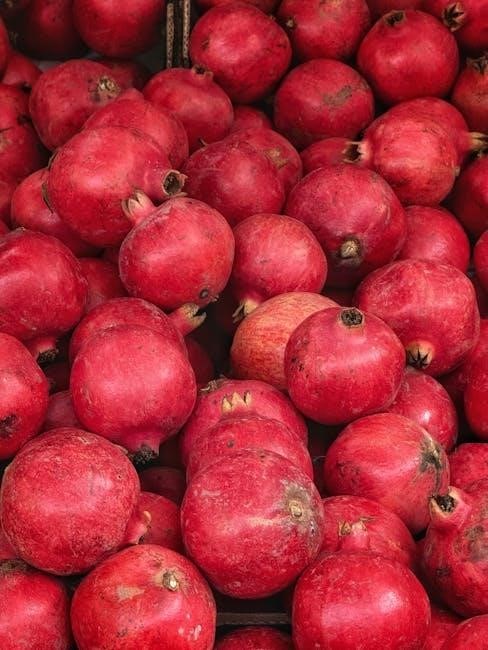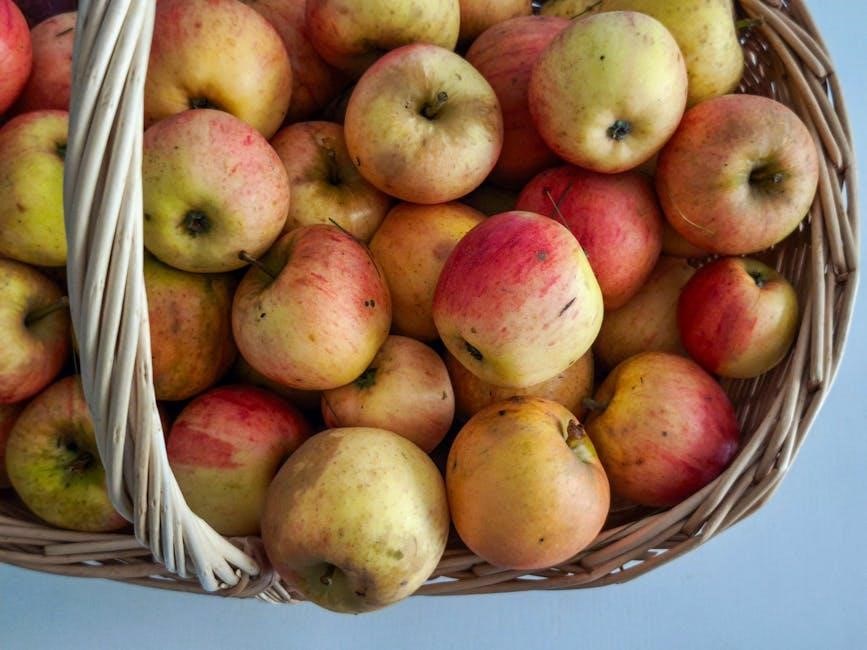The Bible Diet Food List offers a holistic approach to eating, inspired by biblical references. It includes fruits, vegetables, grains, and lean proteins, which promote physical and spiritual well-being.
Overview of the Bible Diet
The Bible Diet is a dietary approach rooted in biblical teachings, emphasizing natural, wholesome foods consumed in ancient times. It focuses on fruits, vegetables, grains, and lean meats, aligning with God’s original intent for human nutrition. This diet avoids processed foods and unhealthy additives, promoting a lifestyle that honors the body as a temple of the Holy Spirit. Inspired by passages like Genesis 1:29 and Daniel’s dietary choices, it encourages mindfulness of what we eat, linking physical health to spiritual well-being. The Bible Diet Food List PDF provides a comprehensive guide, listing foods mentioned in Scripture and offering practical advice for modern application. It serves as a tool for those seeking to align their eating habits with biblical principles, fostering a balanced and faith-centered lifestyle.
Purpose of the Bible Diet Food List
The Bible Diet Food List serves as a guide to help individuals align their dietary choices with biblical teachings. Its primary purpose is to provide a clear and practical reference for those seeking to adopt a healthier, faith-inspired lifestyle. By listing foods mentioned in Scripture, such as fruits, grains, and lean meats, it encourages followers to make informed decisions about their nutrition. The list also includes scripture references, offering spiritual context and reinforcing the connection between physical health and spiritual well-being. This resource aims to empower believers to honor their bodies as temples of the Holy Spirit while fostering a deeper understanding of God’s intent for human health and sustenance.
Historical Context of Biblical Diets
Biblical diets trace back to ancient Israel, where dietary laws in Leviticus and Deuteronomy set guidelines for clean and unclean foods, symbolizing holiness and separation. These practices, rooted in cultural and spiritual traditions, were later reinterpreted in the New Testament, emphasizing grace over legalistic restrictions. The historical context reflects a shift from ritual purity to a broader understanding of spiritual and physical well-being, influencing modern interpretations of biblical eating.
Biblical References to Food and Diet
The Bible provides numerous references to food and diet, shaping the foundation of biblical eating practices. In Genesis 1:29, God granted humanity dominion over the earth, offering fruits, vegetables, and seeds as nourishment. Leviticus and Deuteronomy outline dietary laws, distinguishing clean and unclean foods, which served as spiritual and health guidelines for the Israelites. The New Testament, particularly Acts 10, highlights a shift in dietary restrictions, emphasizing grace and unity. Proverbs 23:20-21 warns against overindulgence, promoting moderation. Daniel’s diet in Daniel 1:8-14 exemplifies a commitment to purity through dietary choices. These references collectively emphasize a balanced and intentional approach to eating, reflecting both physical and spiritual well-being. They inspire modern interpretations of the Bible diet, blending ancient wisdom with contemporary health practices.

Significance of Food in Biblical Times
Food held profound cultural, spiritual, and communal significance in biblical times. It was a gift from God, essential for sustenance and a symbol of His provision. Meals often served as occasions for celebration, worship, and fellowship, as seen in Jewish feasts and Jesus’ shared meals with disciples. The Bible diet food list reflects this heritage, emphasizing natural, wholesome ingredients. Food also played a role in rituals and offerings, such as the Passover lamb, signifying redemption and covenant. Additionally, dietary laws in Leviticus and Deuteronomy were not just about health but also about holiness and community identity. Food was a means of connecting with God, others, and creation, embodying spiritual and physical nourishment. This timeless wisdom inspires modern interpretations of the Bible diet, blending faith and health seamlessly.

Key Foods in the Bible Diet
The Bible Diet emphasizes whole, natural foods like fruits (grapes, pomegranates), grains (barley, wheat), lean meats (lamb, fish), and herbs (olive oil, honey), aligning with biblical traditions.
Fruits and Vegetables Mentioned in the Bible
The Bible highlights various fruits and vegetables that were central to ancient diets. Figs, grapes, pomegranates, and olives are frequently mentioned, emphasizing their nutritional and spiritual significance. Vegetables like cucumbers, melons, and leafy greens such as parsley are also noted. These foods, rich in vitamins and antioxidants, were not only sustenance but also symbols of abundance and divine provision. For instance, Numbers 11:5 references cucumbers and melons from Egypt, while Deuteronomy 8:8 praises the Promised Land for its fruits and herbs. These biblical references underscore the importance of whole, natural foods in promoting health and spiritual well-being, aligning with modern dietary principles of wholesomeness and sustainability.
Grains and Legumes in Biblical Times
The Bible frequently mentions grains and legumes as staples in ancient diets. Barley, wheat, and spelt were common grains, often used to make bread, a foundational food. Legumes like lentils and chickpeas were also prominent, providing essential protein. For example, Exodus 9:31 references spelt, while 2 Samuel 17:28 mentions wheat. These foods were not only nourishing but also held cultural and spiritual significance. Barley, in particular, was valued for its versatility and nutritional benefits, as noted in scientific studies. Grains and legumes were integral to biblical meals, offering sustained energy and supporting overall health. Their inclusion in the Bible diet food list highlights their enduring importance as wholesome, natural ingredients for modern dietary practices.
Proteins and Meats in the Bible Diet
The Bible diet includes a variety of proteins and meats, such as lamb, fish, and locusts, which were common in ancient times. These foods were not only a source of sustenance but also held spiritual significance. For instance, lamb symbolized purity and sacrifice, as seen in Exodus 12:3-11. Fish was a staple for those near water, and its abundance is referenced in Matthew 17:27. Even quail, as mentioned in Numbers 11:31, was provided by God to meet the Israelites’ needs. These proteins were consumed in moderation, emphasizing balance and gratitude. The Bible diet food list encourages mindful eating, aligning with biblical principles of stewardship and care for the body as God’s temple (1 Corinthians 10:31).
Spices and Herbs Referenced in Scripture
The Bible diet food list includes a variety of spices and herbs that were not only used for flavor but also for their medicinal and spiritual properties. Cinnamon, frankincense, and myrrh are prominent in Scripture, often used in worship and rituals. For example, Exodus 30:23-24 describes the use of cinnamon in holy anointing oil. Frankincense and myrrh, mentioned in Matthew 2:11, were valued for their aromatic and healing qualities. Hyssop, referenced in John 19:29, was used for purification rituals. These spices and herbs were integral to ancient biblical practices, emphasizing natural remedies and holistic well-being. The Bible diet encourages incorporating these elements to promote both physical health and spiritual connection, aligning with God’s provision for humanity’s needs.

Health Benefits of the Bible Diet
The Bible diet promotes physical health and spiritual well-being by focusing on nutrient-rich foods like barley, olives, and pomegranates, which support heart health and provide essential nutrients.
Nutritional Value of Biblical Foods

Biblical foods are rich in essential nutrients, offering numerous health benefits. Barley, for instance, is high in fiber and vitamins like E, B6, and B2, which support heart health and energy levels. Olives and olive oil, prominent in the Bible, are excellent sources of healthy fats, reducing inflammation and improving cardiovascular well-being. Fruits like pomegranates and grapes provide antioxidants, while vegetables such as bitter herbs offer detoxifying properties. Whole grains like wheat and spelt are packed with B vitamins and minerals, promoting digestive health. These foods, inspired by scripture, form a balanced diet that nourishes both the body and spirit, aligning with modern nutritional science and ancient wisdom.
Physical Health Benefits of the Diet
The Bible Diet emphasizes whole, nutrient-dense foods that promote physical health. Foods like barley, olives, and pomegranates are rich in fiber, antioxidants, and healthy fats, which support heart health and reduce inflammation; The diet’s focus on lean proteins, such as fish and lamb, provides essential amino acids for muscle repair and growth. Whole grains like wheat and spelt offer sustained energy and digestive health. By avoiding processed foods and emphasizing natural ingredients, the Bible Diet helps with weight management and reduces the risk of chronic diseases like diabetes and hypertension. This approach aligns with modern dietary recommendations, making it a balanced and sustainable choice for overall wellness.
Mental and Spiritual Well-Being
The Bible Diet fosters mental and spiritual well-being by encouraging a mindful and grateful approach to eating. By focusing on natural, wholesome foods, individuals can cultivate a deeper connection to God’s creation and their own bodies. The diet’s emphasis on simplicity and moderation aligns with biblical teachings about self-control and stewardship. Eating with intention and thankfulness, as encouraged in Scripture, promotes a sense of peace and contentment. Additionally, the diet’s holistic nature reminds believers that caring for their physical health is an act of honoring God, as the body is described as a temple of the Holy Spirit (1 Corinthians 6:19-20). This spiritual perspective on food enhances overall well-being and strengthens faith.

Practical Application of the Bible Diet

The Bible Diet encourages incorporating biblical foods into daily meals, offering a practical guide for modern lifestyles. It promotes meal planning with ancient ingredients and modern recipes, fostering a holistic approach to nutrition that nourishes both body and spirit.

Meal Planning and Recipes
Meal planning on the Bible Diet involves incorporating ancient ingredients into modern recipes, ensuring a balanced and nutritious approach. Recipes often feature biblical foods like olives, pomegranates, and barley, which are rich in nutrients and flavor. The diet emphasizes whole, unprocessed foods, aligning with biblical principles of natural eating. Many resources, such as the Bible Diet Food List PDF, provide detailed meal ideas and scripture references, making it easier to plan meals that honor both physical and spiritual health. These recipes not only nourish the body but also foster a deeper connection to faith and heritage, creating a holistic dining experience.
Modern Interpretations of Biblical Eating
Modern interpretations of biblical eating adapt ancient dietary principles to contemporary lifestyles. Many individuals embrace the Bible Diet Food List as a guide, focusing on whole, unprocessed foods like fruits, vegetables, and whole grains. The emphasis is on natural nutrition, aligning with biblical teachings about caring for the body as a temple. Some modern approaches incorporate these foods into recipes that blend tradition with innovation, making the diet accessible and practical. Resources like the Bible Diet Food List PDF provide structured guidance, helping individuals apply these principles in daily life. This modern take on biblical eating promotes a balanced lifestyle that honors both physical health and spiritual well-being, offering a fresh perspective on ancient wisdom;
Spiritual Connection to the Bible Diet

The Bible Diet fosters a spiritual connection by emphasizing care for the body as God’s temple. It encourages mindful eating and gratitude, reflecting faith and devotion in daily life.
Food as a Spiritual Practice
Food in the Bible Diet serves as a spiritual practice, fostering a deeper connection with God; Eating mindfully and with gratitude reflects faith and devotion, aligning daily habits with biblical principles. The act of consuming wholesome foods, as outlined in scripture, is seen as a form of worship, honoring God by caring for the body as His temple. This practice encourages believers to view meals as sacred moments, not just sustenance, but opportunities to express thanksgiving and reverence. By adhering to the Bible Diet Food List, individuals embody spiritual discipline, recognizing the divine provision in every bite. This holistic approach to eating strengthens both physical and spiritual well-being, creating a harmonious balance in life.
Fasting and Abstinence in the Bible
Fasting and abstinence are deeply rooted in biblical traditions, serving as spiritual practices to deepen faith and seek divine guidance. The Bible often highlights fasting as a means of humbling oneself before God, as seen in examples like Jesus’s 40-day fast in the wilderness. This practice is not merely about abstaining from food but about focusing on prayer and spiritual renewal. Fasting is also associated with times of repentance, mourning, and seeking God’s will, as illustrated by Daniel and Esther. The Bible Diet Food List acknowledges fasting as a way to detoxify the body and renew the spirit, aligning physical discipline with spiritual growth. By incorporating fasting, believers emulate biblical examples, fostering a deeper connection with God and His teachings.
The Bible Diet Food List offers a holistic approach to eating, combining physical health with spiritual growth. By focusing on biblical foods, it guides individuals toward a balanced lifestyle that honors God’s creation and promotes well-being.
Final Thoughts on the Bible Diet
The Bible Diet Food List provides a comprehensive guide to healthy eating rooted in biblical principles; It emphasizes whole, natural foods like fruits, vegetables, grains, and lean proteins, promoting physical and spiritual well-being. By adhering to this diet, individuals can experience improved health, increased energy, and a deeper connection to their faith. The inclusion of scripture references adds a layer of spiritual significance, making meals a form of worship and gratitude.
Ultimately, the Bible Diet is not just about food; it’s a lifestyle that honors God’s creation. It encourages mindfulness, balance, and stewardship of the body, aligning with the biblical mandate to treat our bodies as temples of the Holy Spirit. This approach fosters holistic health, bridging the gap between physical nourishment and spiritual growth.
Resources for Further Exploration
For those interested in delving deeper into the Bible Diet Food List, numerous resources are available. The Bible Diet Food List PDF provides a detailed guide, complete with scripture references and nutritional insights. Books like The Bible Diet and Herbs of the Bible offer extensive information on biblical eating. Websites and ministries dedicated to faith-based health also share recipes and meal plans aligned with biblical principles. Additionally, studying passages like Genesis 1:29, Daniel 1, and Matthew 6:25-34 offers spiritual context. These resources empower individuals to adopt a holistic approach to diet, combining physical health with spiritual growth. Exploring these materials can enhance understanding and application of the Bible Diet in modern life.





